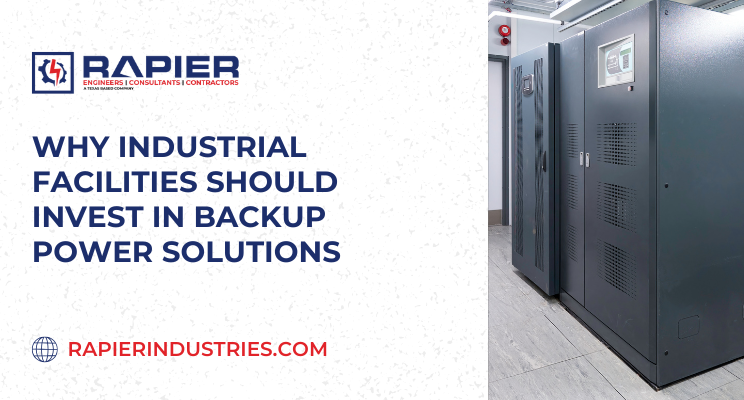If you work at or manage a large-scale industrial facility, you know how important meeting quotas and minimizing downtime is to long-term success. However, unexpected events such as equipment incidents and inclement weather can cripple a facility’s operations and shut down production if it is not properly equipped. There are several ways an industrial facility can be protected from power outages; two of the most highly-effective equipment that can safeguard your facility are Uninterruptible Power Supply and Electric Generators. Let’s learn more about what these systems can do for your industrial facility.
What is an Uninterruptible Power Supply?
Uninterruptible Power Supply, commonly known as UPS, is a piece of equipment that provides power to computers, machinery, and other critical devices when a power outage occurs. These systems are designed to activate immediately without a drop in power after a facility’s main power supply fails to keep vital operations running for a short period of time.
What is an Electric Generator?
Electric generators are machines that convert mechanical energy into electricity, which is then used to power electrical equipment. Unlike a UPS, generators can be used to power an industrial facility for hours or even days after a power outage occurs depending on the size of its fuel tank. Generators are also manufactured in a variety of sizes to make them more suitable for different applications.
Differences Between Uninterruptible Power Supply and Electric Generators
Uninterruptible Power Supply and generators are similar in that they both serve to power industrial facilities after power outages, thus preventing unexpected downtime from occurring. Excessive downtime can lead to significant losses in production and workplace efficiency; recent studies from Forbes have shown that unplanned downtime can cost industrial manufacturers up to $50 billion annually. Thus, getting the power back on after an incident is paramount. There are some key differences and benefits between UPS and generators to be aware of when deciding to install these systems and how they complement each other:
1. UPS are Designed to Provide Uninterruptible Power
A benefit that a UPS provides is immediate power delivery; these systems are designed to instantly switch on and power key components of an industrial facility as soon as a power outage occurs. Electric generators can take several minutes to power on and get running, so a UPS ensures that there is no stoppage period between an outage and switching over to generator power.
2. Generators Can Power A Facility for Longer
While a UPS can provide immediate power to your facility’s critical systems in the event of a power outage, they can only do so for a limited period of time. Depending on the load, most UPS systems are designed to remain operational for only 15 minutes before running out of power, but generators can keep the lights on for hours or even days at a time. Plus, generators can be refueled while in use if the power outage has the potential to outlast its fuel supply.
3. UPS are Used for Critical Circuits and Generators are Used for Large Circuits and Long Durations
During an outage, electric generators provide the muscle for large equipment loads that can withstand being offline for a minute or two while the generator spools up. UPS are used for smaller loads that are critical to the facility and may hinder safety or production if power is dropped even for a second. For example, fire alarm systems are code required to be backed up by batteries. Other critical loads that should be backed up by a UPS are computer or control systems that have risk involved with rebooting the system. One example of this is production line equipment; while the motors and drives for the actual production line may be fine turning off and then back on when the generator comes online, the line automation system run by computers may take hours or days to get back operations if power was lost.
Should I Install a UPS or an Electric Generator in My Industrial Facility?
While both of these systems perform the same task, their differences make it seem as if one is more beneficial to an industrial facility than the other. However, generators and UPS systems are the most effective when paired together. The immediate power delivery of a UPS serves to keep your facility running when the power goes out while electric generators help sustain it. While incidents can happen at any time, the combined capabilities of a UPS and an electrical generator can reduce the lost productivity caused by downtime. A Critical Loads Study can be performed to determine the best systems to minimize safety and production risk.
RAPIER Industries: Your Partner for Industrial Facility Optimization
Staying at the forefront of industrial facility optimization leads to increased efficiency, reduced operating costs, and enhanced workplace safety, but finding a place to start can be daunting. With the RAPIER Industries team by your side, you have a trusted partner that can help you realize the benefits of backup and uninterruptible power solutions. Our experience spans across several sectors of American Industry, from preventative maintenance to industrial consulting and more. Ready to get to work? Give us a call today to learn more about our backup and uninterruptible power solutions.


